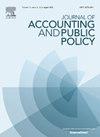Employee ownership and corporate tax avoidance: Evidence from employee shareholders in Chinese state-owned enterprises
IF 2.2
3区 管理学
Q1 BUSINESS, FINANCE
引用次数: 0
Abstract
This study investigates how employee ownership aligns the interests of employees and shareholders in the context in which controlling and minority shareholders have divergent interests. Specifically, we focus on ownership by employee shareholders—entities that represent employees in holding shares—and examine its impact on tax avoidance in Chinese state-owned enterprises (SOEs), where such divergent interests are particularly evident. Using propensity score matching and instrumental variable analysis, we find that employee shareholder ownership is positively associated with tax avoidance in SOEs, which is consistent with the interests of minority shareholders. This effect is more pronounced in SOEs where employee shareholders either represent a large percentage of employees or are employee-run firms, and it is also stronger in SOEs with a high-quality internal information environment or strong employee bargaining power. Moreover, we show that SOEs with higher employee shareholder ownership increase tax contributions in regions where government-controlling shareholders are located, despite a reduction in overall tax rates. Finally, our additional analyses reveal that the effect of employee shareholder ownership diminishes in firms with confrontational employee-manager relations, high job offshoring risks, or limited government intervention. This study demonstrates that substantial employee ownership can provide policymakers with a novel alternative for reducing government intervention in SOEs.
员工持股与企业避税:来自中国国有企业员工股东的证据
本研究探讨了在控股股东和少数股东利益分歧的背景下,员工所有权如何使员工和股东的利益保持一致。具体而言,我们将重点关注员工股东(代表员工持股的实体)的所有权,并研究其对中国国有企业(SOEs)避税的影响,在这些企业中,这种利益分歧尤为明显。通过倾向得分匹配和工具变量分析,我们发现国有企业员工持股与避税正相关,这与中小股东的利益是一致的。这种效应在员工股东占员工比例较大或员工经营企业的国有企业中更为明显,在内部信息环境高质量或员工议价能力强的国有企业中更为明显。此外,我们表明,尽管总体税率降低,但在政府控股股东所在地区,员工持股比例较高的国有企业增加了税收贡献。最后,我们的进一步分析表明,在员工-经理关系对抗性、工作外包风险高或政府干预有限的公司中,员工股东所有权的影响会减弱。本研究表明,大量的员工持股可以为政策制定者提供减少政府对国有企业干预的新选择。
本文章由计算机程序翻译,如有差异,请以英文原文为准。
求助全文
约1分钟内获得全文
求助全文
来源期刊

Journal of Accounting and Public Policy
Multiple-
CiteScore
4.80
自引率
2.80%
发文量
75
期刊介绍:
The Journal of Accounting and Public Policy publishes research papers focusing on the intersection between accounting and public policy. Preference is given to papers illuminating through theoretical or empirical analysis, the effects of accounting on public policy and vice-versa. Subjects treated in this journal include the interface of accounting with economics, political science, sociology, or law. The Journal includes a section entitled Accounting Letters. This section publishes short research articles that should not exceed approximately 3,000 words. The objective of this section is to facilitate the rapid dissemination of important accounting research. Accordingly, articles submitted to this section will be reviewed within fours weeks of receipt, revisions will be limited to one, and publication will occur within four months of acceptance.
 求助内容:
求助内容: 应助结果提醒方式:
应助结果提醒方式:


